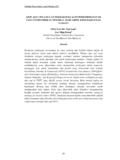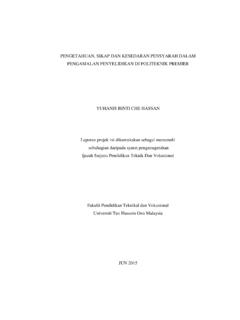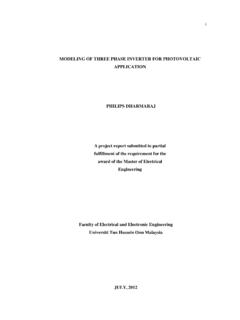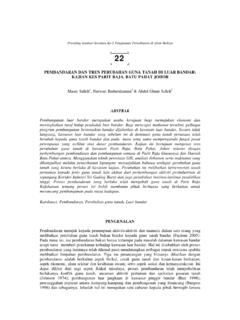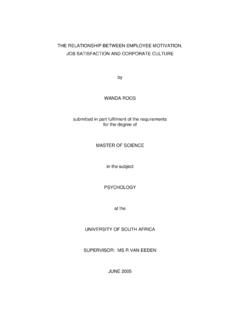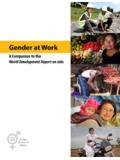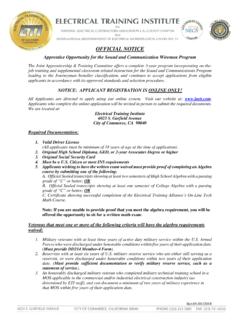Transcription of GENERATION X AND Y AND THEIR WORK MOTIVATION
1 Proceedings International Conference of Technology Management, Business and Entrepreneurship 2012 (ICTMBE2012), Renaissance Hotel, Melaka, Malaysia 18-19 Dec 2012 396 GENERATION X AND Y AND THEIR work MOTIVATION Tan Shen Kian Email: Wan Fauziah Wan Yusoff Email: Faculty of Technology Management and Business University Tun Hussein Onn Malaysia ABSTRACT The contemporary way of living and the economic effects has had its consequence on the way business activities today handle the MOTIVATION of employees. Hence, organizations need to determine the best way to motivate THEIR employees. This paper explores and determines motivational factors for GENERATION X and GENERATION Y employees in electric and electronic industry in Malaysia.
2 Quantitative approach with self-administered questionnaire method has been employed for data collection of this study. A total number of 124 respondents based on Cluster sampling were participated in this research. This study revealed that both generations X and Y showing some differences in THEIR Intrinsic and Extrinsic MOTIVATION factors. It is recommended that organizations should modulate THEIR operations and procedures to properly satisfy two distinct groups of generations. Keywords: GENERATION X, GENERATION Y, Intrinsic MOTIVATION Factors, Extrinsic MOTIVATION Factors 1 Introduction To be successful in today s global rivalry market, organizations need to focus more on transforming THEIR working environments to motivate THEIR employees to engage in behaviour that is consistent with THEIR goal (Amar, 2004).
3 Hence, motivating employees in the present day business activities are different from years ago (Agarwal et. al., 2001) because each GENERATION have THEIR own preference in working environment and expectations from THEIR contributions. Organizations not only need to understand the importance of employees motivations, they also should comprehend the variances in preferences of MOTIVATION factors between various groups of employees generations. Failure in satisfying these aspects could result in decline of organizations total effectiveness. Subsequently resulting unwanted working environments which hinders employees contributions towards casting into knowledge-based economy.
4 Unfortunately, employees MOTIVATION issue found to be as a hidden value in most organization today. The issue is still found to be as intangible assets to sustain THEIR competitive advantages as technology films still putting THEIR efforts in tangible assets like equipment and buildings; leaving least concentration on intelligence capital (Noruzi, 2010). For instance, Giancola (2006) found many organizations still view GENERATION diversity with doubt and are not satisfy with THEIR significant difference. Many organizations still continue with THEIR old methods and procedures in guiding and monitoring THEIR generational Proceedings International Conference of Technology Management, Business and Entrepreneurship 2012 (ICTMBE2012), Renaissance Hotel, Melaka, Malaysia 18-19 Dec 2012 397 diversified employees, including employment activities, operation process, organizational procedures, evaluation criteria, appraisal methods, and remuneration packages.
5 In Malaysian perspective, the shifting of economic from agricultural products to industrial products such as Electric and electronic industry is very much relies on sufficient backups of educated labour force, market-oriented economy and good infrastructures. In order to sustain the global competitiveness, Malaysian industries should recognized that factors in deciding today s organization success is not only rely on THEIR technology assets or capital power as years ago productivity (Third Outline Prospective Plan, 2011). Instead employees contribution as well as willingness to abide is becoming more important. Which is why, employees MOTIVATION issues and level of participations will be the linchpin in decide the speed of organization and country advancement.
6 This study serves a purpose as to enhance organizations' awareness on THEIR current business practice in understanding generations differences and henceforth motivating employees to improve THEIR citizenship performance. This paper is structured as follows. First, this paper provides literature review of the study which provides the issues of the study. The paper continues with research methodology, report and discussion of the results. Finally, in its conclusion it highlighted some implications for practitioners. 2 Review of Literature Who are GENERATION X and Y? GENERATION is defined as people that are grouped within a certain range of ages, location they live, and significant life events they experienced at critical developmental stages (Kupperschmidt, 2000).
7 The groups are often referred to as cohorts, whose members are linked to each other through shared life experiences during THEIR formative years. As each cohort ages, it is influenced by what sociologists call generational markers. As products of THEIR environment, members of the cohort are influenced by events that have an impact on all members of the generational grouping (Zemke et al. 2000).As a result each GENERATION has its own unique combination of experiences, expertise, prospective and expectations. It is believed that THEIR similarities in terms of work values, attitudes, preferences, expectations, perceptions and behaviours are fettled from same or haemophilic historical, economic, and social experiences (Smola & Sutton, 2002; Zemke et al.)
8 , 2000). with proper understanding, accepting and cooperation of these generations, organisation will enjoy stronger competitive advantages by utilizing and sharing THEIR unique experiences and expertises GENERATION X GENERATION X refers to as Lost GENERATION that are born between 1966 - 1976 and reaching THEIR age of 36 to 46 years old as of year 2012 (William, 2008, Tay, 2011). GENERATION X learned from THEIR elders that following company rules and regulations is least likely secure THEIR jobs (Dougan et. al., 2008). This GENERATION cohorts are placing a high importance on maintaining THEIR work -life balance and constantly seeking for a balance between family, life Proceedings International Conference of Technology Management, Business and Entrepreneurship 2012 (ICTMBE2012), Renaissance Hotel, Melaka, Malaysia 18-19 Dec 2012 398 and work (Gursoy et.
9 Al., 2008; Kaylene et. al., 2010). Hence, they rank THEIR families and personal time very important to a level where they will least likely to sacrifice THEIR leisure hours to go for work . Much of them are not willing to work at the weekends as these are the days they will get along with THEIR families. They are often showing THEIR demands when they face issues that may have effects on THEIR lives (Cole , 2002). A number of studies have discovered GENERATION X possesses some important characteristic. For example Santos and Cox (2000) discovered GENERATION X prefers organization that grant them flexible working schedule, high autonomy, interesting yet challenging work , and continuous opportunity for professional growth.
10 Hence, they treat work delegated to them as tasks and prefer to do it on THEIR own (Murphy, 2010). They are much dependent on THEIR own skills and trust in THEIR own judgments to perform THEIR task independently (Richard, 2007). Gursoy et al. (2008) perceived Gen X employees as employees that prefer to work smartly they will always be looking for THEIR own ways to carry out THEIR task than just follow what THEIR seniors usually do. With the aid of THEIR characteristic nature in technological literacy, they displayed high favor in working environment that fill up by high technology that allowing them to carry out THEIR task independently(Dougan et al., 2008).. In addition, they are much focused on self-career development (Santos & Cox, 2000) and motivated by desire to enhance THEIR professional skills to increase THEIR marketability for future career prospects (Richard, 2007; Dougan et.)
